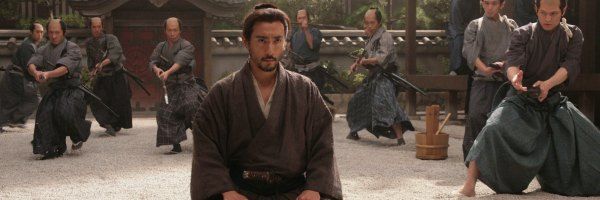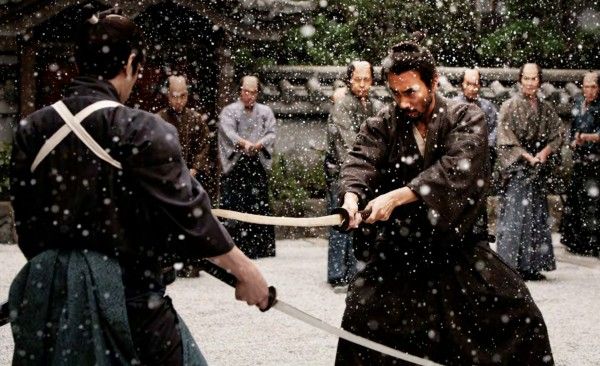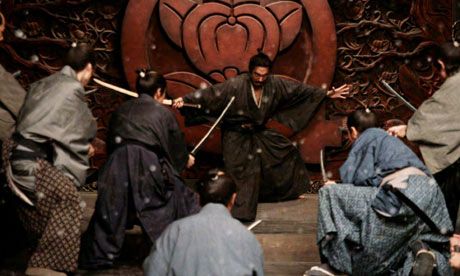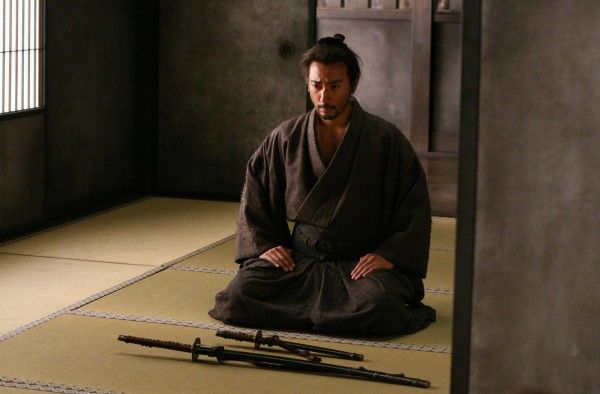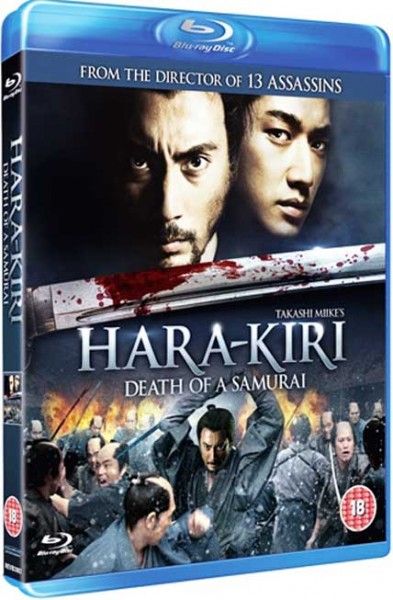Prolific Japanese director Takashi Miike garnered international acclaim in 2011 for the samurai epic 13 Assassins, a remake of the 1963 film of the same name. It was so successful you can even buy it at Target! He followed up with another samurai remake, Hara-Kiri: Death of a Samurai - based on the Masaki Kobayshi 1962 classic Harakiri. Unlike 13 Assassins, Hara-Kiri is more of a sentimental melodrama than an action epic. It's in the vein of classic samurai dramas that examine honor, castes, and revenge. And holy moly is it a sad and beautiful film. More on the Hara-Kiri Blu-ray after the jump.
The film is about the ritual suicide of samurai (also known as seppuku - "stomach cutting"). It goes into some detail about the ceremony, including the bathing of the samurai, dressing in white robes, and sitting on special cloths. Samurai "squire" Hanshiro (Ebizo Ichikawa) comes to a palace and requests the use of their courtyard for his honorable suicide. It's a time of peace, so his line of work isn't pulling in any money . It's a recession for samurais, if you will.
The head of the palace doesn't trust Hanshiro at first. He tells him a story about a young man named Motome (Eita) who recently requested the use of their courtyard to kill himself. Motome gave them the same reason - that there wasn't enough work for a samurai during peacetime. Motome was bluffing though and only came to the palace to beg for money.
See, around the time Motome showed up on their doorstep, there was a rash of "suicide bluffs" going around. Men would come, claiming to be shamed samurais, and ask for the use of their courtyard. Once a palace agrees for hara-kiri to take place, everyone has to go through all the customs with the baths and the robes, and I guess they just got sick of cleaning up all the blood. Instead of allowing the men to kill themselves, they just give them some money and tell them to "chin up."
So basically poor men started taking advantage of this by bluffing suicides. It might not be the most honorable method of getting paid, but it's that or starve. This palace decides to make an example of Motome and forces him to kill himself (in an extremely brutal manner). Now months later here's Hanshiro, saying he wants to kill himself. The palace heads aren't sure if it's a bluff or not. They even give him the chance to walk away. But Hanshiro insists he's not bluffing, so they lead him into the courtyard and the ritual begins.
It quickly becomes apparent something's up. Three of the palace's main warriors are missing and cannot be located. Now it's Hanshiro's turn to tell a story. The film then flashbacks through several stages of Motome's life - from infancy to fatherhood. It gets a bit sentimental at times, but Miike does a good job of still making these melodramatic flashbacks completely engrossing. Motome's life story is utterly heart-wrenching and ultimately devastating. Miike goes through all of the horrible shit that led him to the suicide bluff. And believe me, it's a devastating tale.
Hanshiro's point is that Motome wasn't just some freeloading loser sticking his hand out for some sake money. Because he wasn't from their class, they looked down upon him and smiled as he suffered an agonizing, humiliating death. Now here's Hanshiro, another member of a lower caste, come to get revenge through a sacrifice these snobs will never understand.
It's a relevant critique of class and misused privilege as well as being a harsh examination of honor. The epilogue shows the palace heads covering up to their lord what happened. They're cowards and the whole tragic story of Motome and Hanshiro could've ended without bloodshed if the upper caste believed in the honor codes they obviously don't live by.
Hara-Kiri is a simple story, but a very emotional and timeless one. Miike directs with precision and restraint - the latter being a trait many viewers mistake for "boring." It's a departure from the samurai epic of 13 Assassins, but when the swords do come out, buckle up.
Hara-Kiri is presented by Tribeca Film New Video in 1080p HD 2.39:1 with DTS-HD Master Audio 5.1 and 2.0. The film is heavy on browns and blacks. It can wicked dark at times. The HD is flawless though, and when there is some break in the darkness, the color contrast POPS. The surround track offers an immersive experience, especially during the outdoor scenes when birds are chirping and leaves are falling.
The only special feature is a brief video of Tribeca Film's Geoffrey Gilmore. In under two minutes he talks about what he likes about the film and the differences between Miike's and the original. Basically though, it's an ad for American Express.

